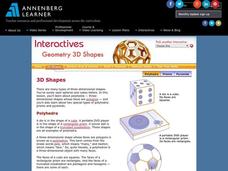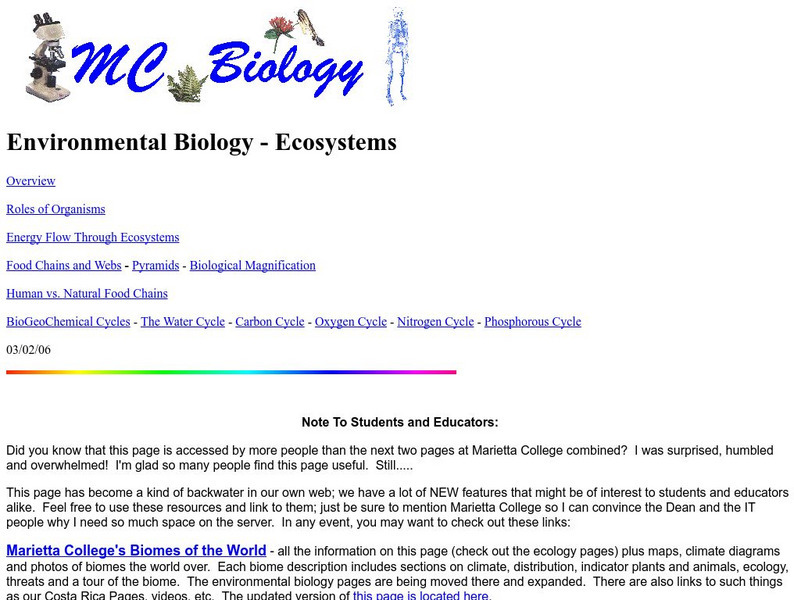Curated OER
Texas Ecoregions Summary Sheet
In this ecoregions of Texas worksheet, students complete a summary of a particular ecoregion in Texas. They find the producers and consumers of the region, they draw a food chain, the draw a food web, and they complete an energy pyramid...
Curated OER
Predator-Prey Relationships
Students explore the interrelatedness of predators and prey in four different activities. They simulate an aquatic insect, fish, and osprey food chain during a poker chip game, play an M&M game to simulate the relationship between...
Curated OER
Human Populations Studies: the Ghost of Populations Past
Students compile data on population distribution and develop survivorship curves using information from cemetery tombstones and obituaries. They develop inferences on the changes in population age distribution in their area over time.
Curated OER
Nutrition and Energy Flow
In this energy flow worksheet, students will complete 10 short answer questions based on a food web diagram. Then students will review different cycles in nature including the water cycle, carbon cycle, and energy cycle. This worksheet...
Curated OER
Food Webs
Students recognize interdependence in a food web by using yarn and notecards to create a food web and discussing what would happen if one of the organisms from a certain trophic level is removed.
Annenberg Foundation
Geometry 3D Shapes: 3D Shapes
Explore vocabulary related to three-dimensional shapes. An instructional website describes the characteristics of different geometric solids. Learners can use an interactive component to view nets, faces, vertices, and edges of common...
Curated OER
Ecosystem Tumble
Students create visual representations of ecosystems. In this ecology lesson plan, students discuss the interdependence of plants and animals in various ecosystems. Students cut pictures from magazines and glue them on sturdy blocks. ...
Curated OER
Predator-Prey Relationships
Students understand ecological systems. They provide experiences to assist citizens to increase their sensitivity and stewardship for the environment.
Curated OER
Indicator Species
Students explore the ecological foundation of India's and ways to save the forests, water and the India tiger. After a lecture on identifying a healthy forest and the importance of the animals, students participate in activities to...
Captain Planet Foundation
Energy Flow in the Garden
How can you tell what an owl has eaten? Study the food chain and flow of energy in an ecosystem by dissecting an owl pellet and noting the bones found inside. Additionally, the lesson plan includes a game about consumers and producers...
Curated OER
Predator and Prey Game
Students explore the why the balance among producers, predators and prey is necessary in order for an ecosystem to be sustained over time. Through web games and activities, they discover how each component of the food chain works to...
Illinois Department of Natural Resources
Section Four: How Can We Protect Biodiversity?
Look into the future with a lesson plan on biodiversity and natural habitats. Learners read articles about different perspectives when it comes to planning future development, and decide which angle is the highest priority in a group...
Annenberg Foundation
Geometry 3D Shapes: Euler's Theorem
How do you get a theorem named after you? Euler knows what it takes! The third lesson of five asks pupils to use an interactive activity to compare the faces, vertices, and edges of seven different three-dimensional solids. They use...
Curated OER
Great Lakes Food Web
Students identify species and components of a Great Lakes food web. Using note cards, they place themselves in the correct order of the food chain based on the species present. They discuss what they believe happens to various species...
Curated OER
Biology: living Things and their Environment
Students recognize that organisms depend on other organisms. In this organism lesson, students understand symbiotic relationships and competition. Students explain food chains and food webs. Students understand that change is always...
Curated OER
Who Can Harvest A Walleye?
Seventh graders investigate the concept of how an ecosystem is put together while conducting research using a variety of resources. They correctly differentiate between a herbivore and carnivore by placing them in the order of hierarchy...
Bio Topics
Bio Topics: Ecological Pyramids
A colorful tutorial about ecological pyramids. Read the information, and then check your understanding with some questions and answers about the topic.
Texas Education Agency
Texas Gateway: Organism Relationships: Food Chains, Webs, Pyramids
Given illustrations, students will analyze the flow of matter and energy in food chains, food webs, and ecological pyramids.
FT Exploring
Ft Exploring: Energy Pyramid and Food Chains
This illustrated guide to food chains and ecological pyramids will help clarify how energy flows through an ecosystem.
Other
Marietta College: Ecosystems
Complete illustrated discussion of energy flow within ecosystems, including discussions of trophic levels, ecological pyramids, food chains and webs, biological magnification, and cycles.
Sophia Learning
Sophia: Energy Pyramids: Lesson 2
This lesson will introduce energy pyramids, and show how energy moves from one trophic level to the next. It is 2 of 4 in the series titled "Energy Pyramids."
Soft Schools
Soft Schools: Ecology Quiz
Take this interactive, multiple-choice quiz over concepts in ecology, then review your score and any missed questions at the end.
Science Education Resource Center at Carleton College
Serc: Energy Pyramids in Different Biome Locations
A research activity where students research the various biotic and abiotic factors that combine to make up a biome. The end product will be the creation of a PowerPoint presentation that identifies these factors and the creation of an...
Georgia Department of Education
Ga Virtual Learning: Biology: Ecology I
A comprehensive ecology learning module where students assess the dependence of all organisms on one another and the flow of energy and matter within their ecosystems.

























